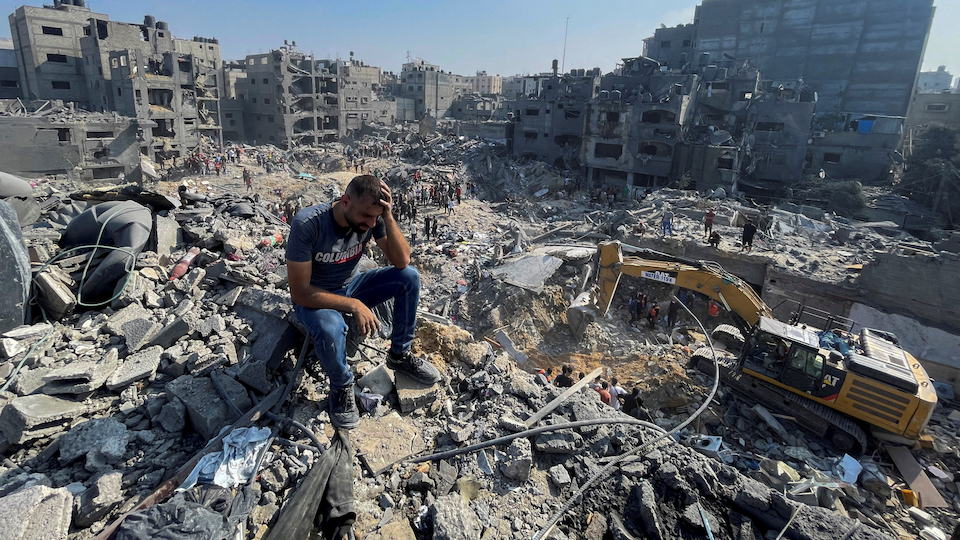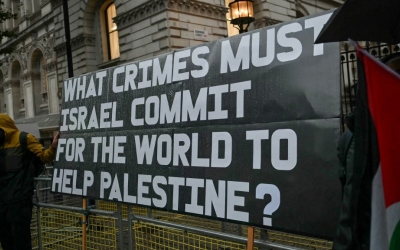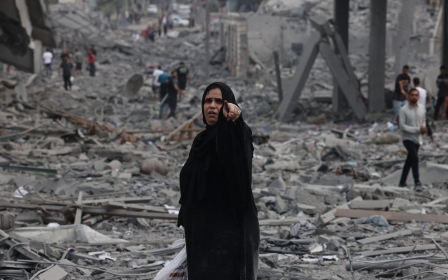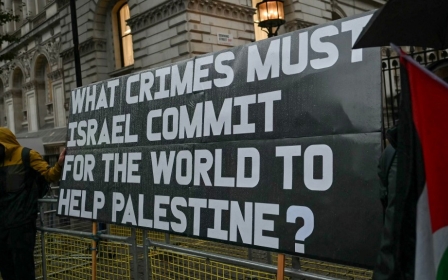Israel-Palestine war: Why must Palestinians condemn themselves for daring to fight back?

“But do you condemn Hamas?” The question comes like clockwork.
In the street, on campus, or in those rare moments when a Palestinian, or a supporter of Palestinian liberation, is interviewed by a mainstream media outlet, the question inevitably comes. On one level, we know why: by holding all Palestinians responsible for Hamas, Palestinian resistance as a whole can be discredited by proxy.
When Israeli military and political officials, literal agents of military violence against Palestinians, are paraded on CNN, they are not asked to condemn carpet bombing, collective punishment, or the targeting of civilians as a precondition to beginning a conversation.
The Palestinian interviewee faces a different reality, however. When they rightly shift focus to denounce a brutal, military occupation, they are quickly rebuffed, forced to recalibrate to the mandatory initial task: condemnation.
Not only is the grammatical construction “do you” a fallacy that flattens 75 years of settler colonialism into a simple yes or no, but in the process it also individualises, centring personal feelings: one must condemn Palestinians before one can even mention, much less condemn, the genocidal onslaught that has already killed more than 10,000 in the past month.
We should be clear: this call to condemn is a trap. And it’s designed to ensnare the already condemned.
Already condemned
Since the unprecedented events of 7 October, many have turned for guidance and inspiration to the anti-colonial revolutionary Frantz Fanon, and with good reason. In Wretched of the Earth, penned amid the crucible of Algeria’s anti-colonial struggle, Fanon famously described the colony as a world cut in two, a Manichaean world of good and evil, its geographical division established and upheld by pure violence and little else.
His description is brutally apt for contemporary Palestine, and even more so the open-air prison camp of Gaza. And so is his oft-cited insistence that decolonisation is an inescapably violent affair: colonial violence has been pumped mercilessly into Gaza for decades. At some point, like a balloon, it can only explode.
Follow Middle East Eye's live coverage for the latest on the Israel-Palestine war
But equally important for Fanon is the question of condemnation. In fact, his famous “wretched” is nothing less than a notoriously misleading translation of the damnés, the damned or condemned.
Colonial domination, to justify its rapacious greed, expels the colonised from humanity, racialising and reducing these hyper-exploited, immiserated masses to simply “part of the landscape”. They find themselves trapped in a sort of subterranean existence, what Fanon describes as “a zone of nonbeing… a veritable hell”. And as civil rights lawyer and writer Dylan Saba posted shortly after 7 October: "What is the ethical way to climb out of hell?"
It isn’t enough for Palestinians to be condemned to hell on earth. They must also condemn themselves for daring to fight back
The religious valences of this condemnation are no accident. If Fanon saw the colonial world as divided between good and evil, Israeli Prime Minister Benjamin Netanyahu has spoken in similarly Manichaean terms of an apocalyptic battle between “the children of light and the children of darkness”, even invoking the biblical term “Amalek” to justify the extermination campaign in Gaza. And the fundamental colonial binary - civilisation versus barbarism - retains an astonishing degree of traction today.
For Eliot Cohen in the Atlantic, the fight against Hamas “is about barbarism” plain and simple, adding for good measure that “barbarians fight because they enjoy violence” and “go out of their way to inflict pain, to torture, to rape, and above all to humiliate”. And in a desperate attempt to deny that the Palestinian struggle is an anti-colonial one, Zionist scion Simon Sebag Montefiore merely proves the opposite with the overt colonialism of his own language, writing that “the Hamas attack resembled a medieval Mongol raid for slaughter and human trophies”.
As Fanon’s great teacher, Aime Cesaire, argued so powerfully, not only are colonialism and civilisation incompatible, but by justifying brutality and dehumanisation, colonisers actively dehumanise themselves, becoming barbarians in the process.
It’s no surprise to find a plethora of videos recorded in recent weeks by Israeli soldiers humiliating Palestinian hostages, with even Haaretz reporting how they stripped captives, urinated on them, and burned them with cigarettes. “No one colonises innocently,” Cesaire writes. With every abuse inflicted, “a gangrene sets in” and Israel takes a step closer to barbarism. Someone might want to let Cohen and Montefiore know of the torture, rape, and humiliation happening right under their noses.
Put simply, Palestinians are already condemned, and this symbolic exclusion has very real material consequences. Pressed to the very threshold of humanity, no amount of violence is too much for these “human animals” in the words of Israeli Defence Minister Yoav Gallant.
'Hell on earth'
And where anything can be done, everything will - genocide foretold.
During Israel’s previous assault on Gaza in 2021 that killed more than 260 Palestinians, UN Secretary-General Antonio Guterres described Gaza as “hell on earth”, a reality that has no doubt compounded in the last month with 1.4 million Palestinians internally displaced, and more than half of all residential homes destroyed, no electricity or fuel for hospitals, and amputations being performed on the injured and caesarean sections on pregnant women without anaesthesia.

But it isn’t enough for Palestinians to be pushed to the limits of humanity and condemned to hell on earth. They must also condemn themselves for daring to fight back and topple those walls separating them from the humanity that lay beyond.
The perversity is breathtaking, and the logic, as many have rightly shown, is abusive. To ask Palestinians to condemn “Hamas” today is to demand that they underwrite their own oppression, and it’s a trap because nothing they say will ever be enough (as the House censure of lawmaker Rashida Tlaib makes more than clear).
Condemnation is more than just a trap, however. It’s also a barrier to action that displaces us to the discursive terrain and away from what is everywhere always the concrete reality of decolonisation: taking land back and liberation.
It sidelines the material reality of ongoing Palestinian genocide with the recitation of vapid phrases that can neither bring Israelis back to life nor reverse the more than 30,000 tonnes of bombs Israel has already dropped onto the besieged Gaza Strip - more than the combined nuclear payload of Hiroshima and Nagasaki, and concentrated in a far smaller territory.
And, inversely, too, Secretary-General Guterres, while overseeing an international body purportedly designed to uphold international law, can scarcely muster a weak condemnation of a decades-long occupation and the colonial state that has committed several dozen war crimes in just over a month.
So how do you climb out of hell? For Fanon, one key reason that decolonisation can only be violent is that no matter what tactics the condemned choose, they will always be deemed violent by definition, and met with disproportionate brutality in return. This was clear enough in the 2018 Great March of Return - during which Israeli snipers picked off more than 223 peaceful Palestinians - and with the widespread criminalisation of calls to boycott complicit institutions.
For the dispossessed, no words will suffice - we will go blue in the face before we convince oppressors of the error of their ways
No, escaping condemnation can only begin with an explosion that is as symbolic as it is material, a breaking out which is also a breaking into: into visibility, into existence, into being itself. It is an emergence from subterranean invisibility, metaphors here co-mingling with the reality of a 300-mile network of tunnels under Gaza.
It begins with the demonstration - to oneself and to the world - that the Zionist state is not invincible, and that Palestinians are far more powerful than many believe. This ontological jailbreak has already begun, the later stages of which are all but inevitable.
For the dispossessed, for the entrapped, for the ensnared, for those already condemned to existence under the slow death of settler colonialism, no words will suffice - we will go blue in the face before we convince oppressors of the error of their ways.
While the world continues to demand our condemnation, Israel and the US have mobilised thousands of troops - with the US deploying a cruise missile submarine into nearby waters with a "special operations force" - for their ongoing ground invasion of a besieged prison against a stateless people without a military or navy.
Thankfully, those bearing the brunt of the onslaught today aren’t caught up in the semantic trap of condemnation. For Palestinians in Gaza and beyond, for the wretched of our shared earth, as for Fanon, “to fight is the only solution”.
The views expressed in this article belong to the authors and do not necessarily reflect the editorial policy of Middle East Eye.
Middle East Eye propose une couverture et une analyse indépendantes et incomparables du Moyen-Orient, de l’Afrique du Nord et d’autres régions du monde. Pour en savoir plus sur la reprise de ce contenu et les frais qui s’appliquent, veuillez remplir ce formulaire [en anglais]. Pour en savoir plus sur MEE, cliquez ici [en anglais].




